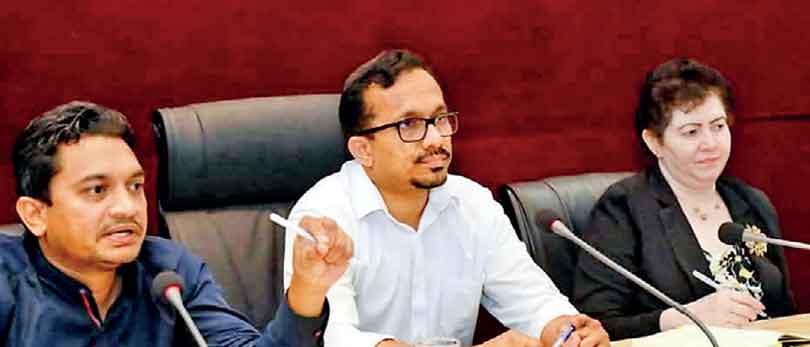Thursday Feb 19, 2026
Thursday Feb 19, 2026
Monday, 6 January 2025 03:36 - - {{hitsCtrl.values.hits}}

Industries and Entrepreneurship Development Minister Sunil Handunneththi (centre) flanked by Deputy Minister Chathuranga Abeysinghe (left) and Secretary Thilaka Jayasundara
The Ministry of Industries and Entrepreneurship Development says it is at the forefront of driving industrialisation and fostering entrepreneurship in the country and has updated some of the measures taken thus far and announced future plans.
Following is the notice issued by Deputy Minister Chathuranga Abeysinghe listing its objectives, spanning key areas to support and grow industries and businesses.
Core objectives: Policy Development; Industrial Support; New Business Creation; Entrepreneurship Support; Traditional Industry Development; SME Development; Export Promotion, and SOE Management.
The Ministry oversees 29 institutions, including prominent entities such as the IDB, SED, NEDA, NPS, NCC, EDB, NDC, SLITA, and SOEs related to minerals, sugar, salt, ceramics, oil, textiles, and crafts.
Key focus areas: Past 40 days
1. Stabilisation of State-Owned Enterprises (SOEs)
Many SOEs face financial challenges and operational risks. To address these, we:
2. Budget and policy development
We worked on:
3. Resolution of the SME debt crisis
The SME sector has been severely affected by the economic crisis. We:
4. Institutional restructuring
Duplication and overlapping roles among entrepreneurship support institutions prompted a restructuring process. We are developing a comprehensive model for lifecycle-based entrepreneurship support.
5. Sectoral support
The Ministry provides targeted assistance to 20 priority industries.
nSignificant efforts were made to resolve challenges in sectors like vehicle assembly, pharmaceuticals, dairy, fisheries, gems, and jewellery.
Public Engagement
Every Monday, the Ministry holds public sessions where Ministers address individual concerns. In just five sessions, we have addressed over 200 individual issues.
Meetings with organisations and Embassies
Scheduling meetings with stakeholders has been a priority. Despite limitations, Ministers have held over 50 meetings each, engaging with organisations and exploring investment opportunities.
Planned initiatives
Our upcoming initiatives are designed to drive innovation, efficiency, and growth:
1. Strategic direction for mineral resources
2. Strategic restructuring of SOEs
3. SME excellence measurement framework
4. Creation of a Rs. 50 billion collateral-free startup loan facility
5. Launch of a venture capital fund for startups
6. National Productivity Awards
7. Nationwide handloom strategy
8. Development of four new industrial zones
9. Digital transformation for service excellence
10. Industrial data database
11. Standard Operating Procedures (SOP) for used metal distribution
12. Advisory Committee for SME funding issues
13. Review of SOPs for EVs
14. New tariff policy
15. Review of current industrial policy
16. Evaluation of existing industrial zones
17. Digital transformation strategy for industry
The Ministry remains committed to addressing immediate challenges while setting a robust foundation for long-term industrial and entrepreneurial success.